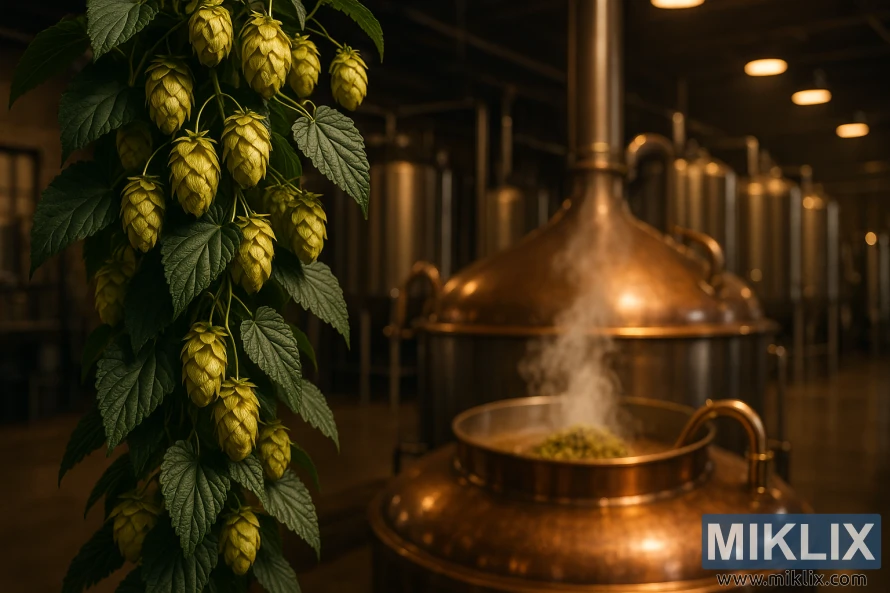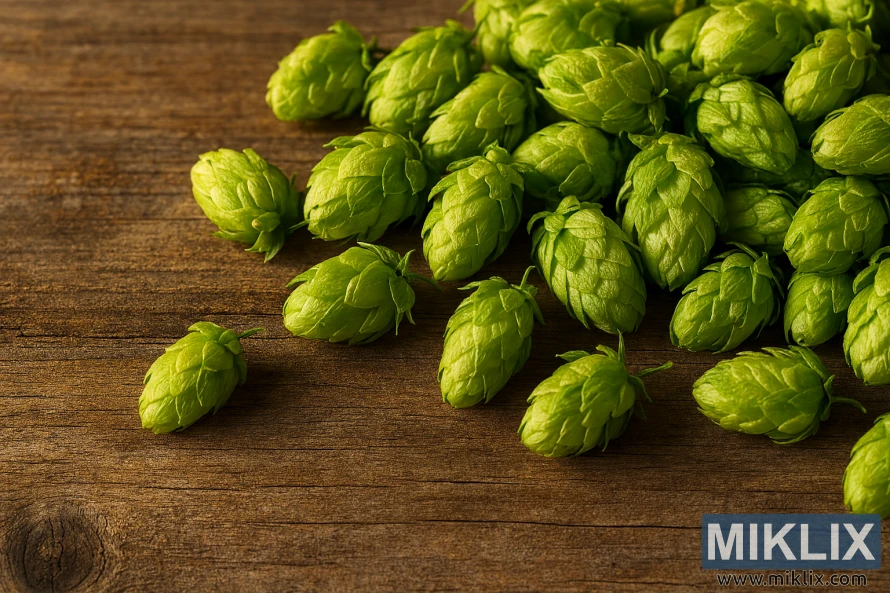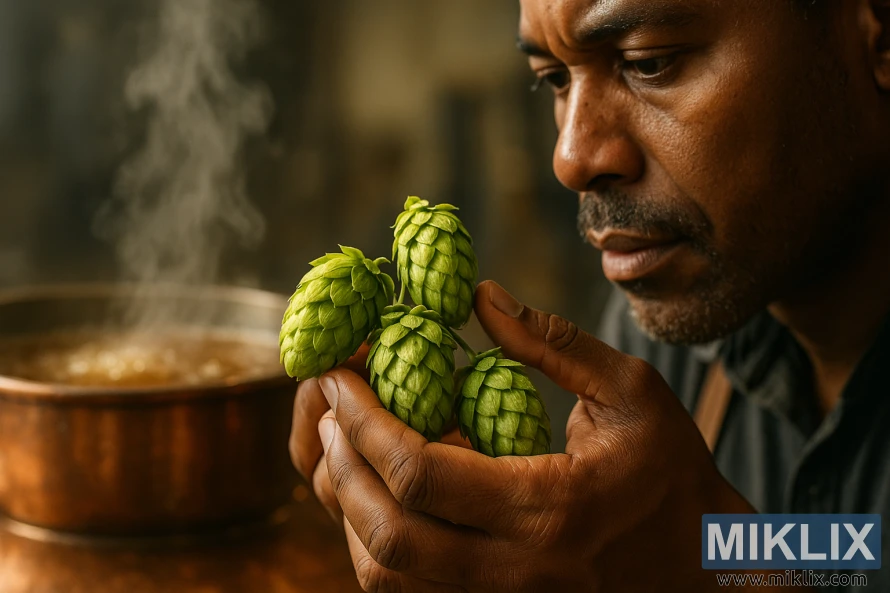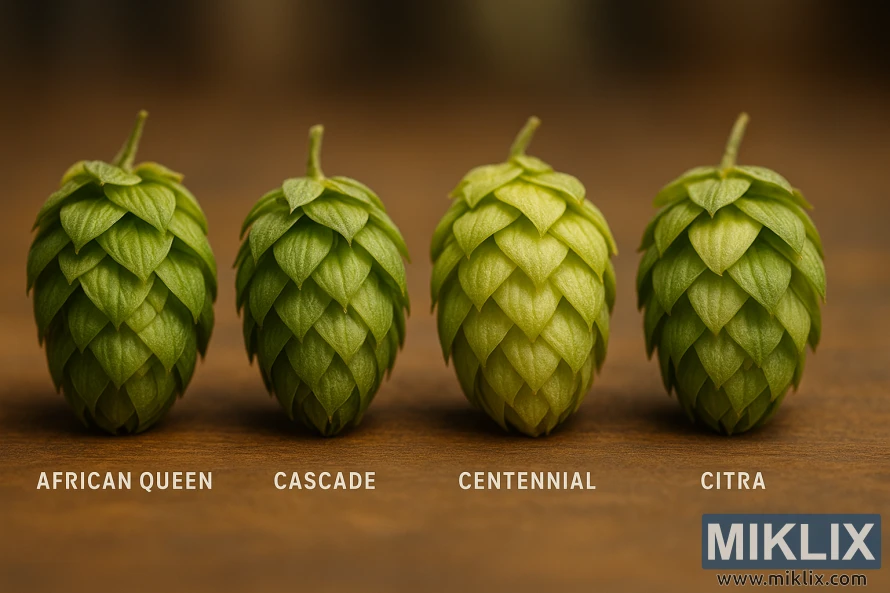Hops in Beer Brewing: African Queen
Published: August 1, 2025 at 12:27:19 PM UTC
Last updated: November 25, 2025 at 8:31:50 AM UTC
Beer brewing has seen a significant transformation with the advent of new hop varieties. Among these, African Queen Hops have emerged as a favorite. Hailing from South Africa, these dual-purpose hops serve as a versatile ingredient. They are ideal for various hop additions throughout the brewing process. African Queen Hops introduce a distinct flavor and aroma to beers. This enhances the brewing experience, leading to unique brews. Their characteristics are well-suited for a wide range of beer styles. This contributes to the rich diversity of flavors in the craft beer world.

Key Takeaways
- African Queen Hops are a dual-purpose hop variety.
- They originated from South Africa.
- These hops can be used in all hop additions throughout the brewing process.
- They offer a unique flavor and aroma profile.
- African Queen Hops enhance the brewing experience and create distinctive beers.
Introduction to African Queen Hops
The African Queen Hop variety emerged from a detailed breeding program, captivating the brewing world in 2014. This hop is a product of a dedicated effort by Gerrie Britz, a celebrated hop breeder for South African Breweries, starting in 1998.
African Queen Hops originate from South Africa, marking a significant achievement in the country's role in the global brewing scene. Their origin is a testament to South African Breweries' commitment to agricultural excellence and innovative breeding methods.
The creation of African Queen Hops involved a thorough selection process. This ensured the final product would bring unique qualities to the brewing process. Released to the market, these hops have quickly become favorites among brewers for their distinct flavors and aromas. They are now a key ingredient in many beer recipes.
The introduction of African Queen Hops to the global market has opened new avenues for brewers. It has introduced a fresh dimension to beer crafting. As brewers continue to explore the possibilities of these hops, their importance in the industry is expected to rise.
Understanding the Unique Properties of African Queen Hops
African Queen Hops bring a complex aroma profile to brewing, making them versatile for unique beers. Their distinct flavor and aroma set them apart, exciting brewers for various beer styles.
The aroma of African Queen Hops combines fruity, floral, and spicy notes. Specific characteristics include:
- Dank and fruity notes, such as blueberries and black currant
- Stone fruit and gooseberries, adding complexity
- Unconventional notes like bubble gum and lemongrass
- Spicy and herbal hints, including chilies
These diverse aroma characteristics make African Queen Hops a favorite among brewers. They seek to create beers with unique flavor profiles. The complexity of their aroma allows for a wide range of brewing applications, from IPAs to stouts and beyond.
The flavor profile of African Queen Hops complements their aroma, providing a rich and complex taste experience. Brewers can use these unique properties to create standout beers in the market.
Understanding African Queen Hops' unique properties opens new possibilities in brewing. Whether crafting a traditional ale or exploring new beer styles, these hops add a unique dimension to your creations.
Chemical Composition and Characteristics
African Queen Hops have a unique chemical makeup that boosts beer's flavor and aroma. Their mix of alpha and beta acids makes them ideal for brewing. This versatility is key in creating different beer styles.
The alpha acid content in African Queen Hops ranges from 10% to 17%. Beta acid content varies between 3.9% and 6.2%. This balance makes them perfect for adding bitterness and flavor/aroma to beer.
The characteristics of African Queen Hops can be summarized as follows:
- Alpha acid content: 10-17%
- Beta acid content: 3.9-6.2%
- Suitable for bittering and flavor/aroma additions
This chemical profile allows brewers to use African Queen Hops in various beer styles. It enhances both the bitterness and the aromatic qualities of their brews.

Flavor and Aroma Profile
Brewers choose African Queen Hops for their unique and complex sensory qualities. The flavor profile includes a wide range of notes. These include blueberries, cassis, passion fruit, citrus, stone fruit, black currant, iced tea, lemongrass, gooseberry, and even chili. This variety makes African Queen Hops a top pick for brewers aiming to craft distinctive beers.
The sensory description of African Queen Hops highlights its versatility and depth. Fruity notes like blueberries and passion fruit add a sweet and enticing quality. The citrus and stone fruit flavors bring a refreshing and crisp touch. Spicy and herbal notes, such as lemongrass, add complexity to the overall taste.
Some of the key flavor and aroma characteristics of African Queen Hops include:
- Fruity notes: blueberries, passion fruit, citrus, and stone fruit
- Floral notes: contributing to a complex and nuanced profile
- Spicy notes: lemongrass and chili, adding depth and warmth
- Herbal notes: iced tea, enriching the overall character
The blend of these diverse flavors and aromas makes African Queen Hops a prized ingredient for brewers. By using African Queen Hops in their recipes, brewers can create beers that are complex, engaging, and memorable.
Best Practices for Storage and Handling
Proper storage and handling of African Queen Hops are critical for brewers. They help preserve the hops' unique flavor and aroma. African Queen Hops come in pellet form, which demands careful storage to keep their quality intact.
To store African Queen Hops effectively, brewers should keep them in a cool, dry place. This spot should be away from direct sunlight and moisture. Such conditions help preserve the delicate flavor and aroma compounds.
Here are some key considerations for storing and handling African Queen Hops:
- Store in airtight containers to prevent exposure to air and moisture.
- Keep the storage area at a consistent refrigerated temperature.
- Minimize exposure to light, as it can cause degradation.
By adhering to these best practices, brewers can ensure their African Queen Hops stay fresh. This freshness is essential for creating high-quality beers.
Brewing Techniques with African Queen Hops
African Queen Hops are perfect for exploring new brewing techniques. They shine in single hop IPA recipes, where their distinct flavor and aroma can be fully appreciated.
When using African Queen Hops, brewers can employ various methods to enhance their qualities. Dry hopping and hop bursting are two popular approaches. Dry hopping adds hops after fermentation to infuse the beer with aroma without bitterness.
Hop bursting, by contrast, involves adding a large amount of hops towards the end of the boil. This maximizes the hop flavor and aroma, making it ideal for African Queen Hops.
Here are some key considerations when brewing with African Queen Hops:
- Experiment with different hop addition times to find the optimal balance for your IPA.
- Consider using African Queen Hops exclusively in your single hop IPA recipe to fully appreciate their unique profile.
- Be mindful of the bitterness level, as African Queen Hops can contribute a substantial amount of bitterness, specially if used in large quantities or added early in the boil.
Brewing with African Queen Hops also invites creativity. Brewers can blend them with other hops for complex flavors. Yet, using them alone in a single hop IPA showcases their pure essence.
In conclusion, African Queen Hops are a versatile ingredient for crafting unique beers, ideal for single hop IPAs. By experimenting with different techniques and understanding their characteristics, brewers can create exceptional brews.

Optimal Addition Timing in the Brewing Process
To fully harness the essence of African Queen Hops, brewers must meticulously plan the timing of their additions. The timing of hop additions profoundly affects the beer's final taste and aroma.
African Queen Hops can be incorporated at different stages of brewing. Bittering additions are usually made early in the boil. In contrast, flavor and aroma additions are added later.
The ideal timing for hop additions varies based on the desired flavor and aroma. For instance, early boil additions contribute to bitterness. Later additions enhance flavor and aroma.
- Early boil additions for bitterness
- Mid-boil additions for flavor
- Late boil or flameout additions for aroma
By fine-tuning the timing of hop additions, brewers can achieve the perfect balance of bitterness, flavor, and aroma in their beer.
Compatible Beer Styles
African Queen Hops are versatile, fitting into a variety of beer styles, from IPA to Belgian Ale. Their distinct flavor and aroma make them a top pick for brewers aiming to craft unique, complex brews.
These hops shine in Pale Ale, adding citrus notes that enrich the beer's character. In IPA, they bring a bold hop flavor that fans of the style love.
In Belgian Ale, African Queen Hops introduce a new level of complexity. Their spicy and fruity undertones enhance the traditional yeast flavors of Belgian beers. This versatility makes them a key ingredient for brewers venturing into different styles.
- IPA: Robust hop flavor
- Pale Ale: Citrus notes enhancement
- Belgian Ale: Adds complexity with spicy and fruity undertones
By using African Queen Hops, brewers can push the boundaries of their beers. They tap into the hops' unique qualities, helping their brews stand out in a crowded market.
Comparing African Queen Hops with Other Varieties
African Queen Hops bring a distinct flavor and aroma to the brewing world. They stand out when compared to other popular hop varieties. Brewers often seek hops that complement or contrast with African Queen Hops, aiming to create complex and unique beers.
Comparing African Queen Hops to Amarillo, Cascade, and Simcoe reveals both differences and similarities. For example, Amarillo hops are celebrated for their citrus and orange notes, differing from African Queen Hops' unique profile.
Cascade hops, in contrast, share floral and citrus notes with African Queen Hops. This makes them a suitable pairing for specific beer styles. Simcoe hops, with their robust pine and earthy flavors, can create a contrasting profile when blended with African Queen Hops.
- African Queen Hops: Unique flavor and aroma profile
- Amarillo: Citrus and orange flavors
- Cascade: Floral and citrus notes
- Simcoe: Robust pine and earthy character
Understanding these comparisons empowers brewers to make informed choices. They can select hop varieties that suit their brewing goals, enabling the creation of a diverse range of beers with distinct characteristics.

Common Brewing Challenges and Solutions
Using African Queen Hops in brewing comes with its own set of challenges, mainly due to hop variability. This variability can greatly affect the flavor and aroma of beers, making consistency a major challenge for brewers.
Brewers often face the issue of inconsistent quality and characteristics in African Queen Hops. This inconsistency can arise from various factors, including growing conditions, harvesting practices, and processing methods. To tackle these challenges, brewers can take several steps.
- It's essential to source high-quality African Queen Hops from trusted suppliers. This means checking the alpha acid content, aroma profile, and ensuring proper storage.
- Monitoring the flavor and aroma of the hops upon receipt and during brewing is vital. This involves sensory evaluation and laboratory analysis.
- Adjusting brewing techniques and recipes based on the hops' characteristics is necessary. This might include adjusting hopping rates, brewhouse operations, or fermentation parameters.
Another challenge is finding the optimal use of African Queen Hops in different beer styles. While these hops are versatile, their unique flavor and aroma may not fit all beer styles. Brewers must experiment to discover the best applications for these hops.
In conclusion, while brewing with African Queen Hops presents several challenges, mainly related to hop variability, brewers can overcome these. They can do this by sourcing high-quality hops, closely monitoring their characteristics, and adjusting their brewing techniques.
Recipe Development Guidelines
Developing a recipe with African Queen Hops requires brewers to understand their unique characteristics. These hops bring a distinct flavor and aroma that can elevate various beer styles.
To effectively use African Queen Hops, brewers should explore different brewing techniques. Techniques like dry hopping and hop bursting can enhance their flavor, adding depth and complexity to the beer.
Successful recipe development hinges on knowing how African Queen Hops interact with other ingredients. By balancing their unique flavor and aroma with complementary malt profiles and yeast strains, brewers can craft innovative and delicious beers.
- Consider the alpha acid content and flavor profile of African Queen Hops when determining the hop addition schedule.
- Experiment with different hop quantities and addition times to achieve the desired flavor and aroma characteristics.
- Pair African Queen Hops with complementary ingredients, such as specific malts and yeast strains, to enhance the overall beer profile.
By adhering to these guidelines and utilizing the unique properties of African Queen Hops, brewers can create innovative recipes. These recipes showcase the versatility and excellence of these hops.
Quality Control Measures
To maximize the African Queen Hops' full flavor, brewers must focus on quality control. This means keeping the hops in the best condition possible. It's all about preserving their taste and aroma.
For optimal storage, African Queen Hops need a cool, dry spot. They should be kept away from sunlight and moisture. This step is key to maintaining the hop's alpha acids and essential oils. These are vital for the beer's taste and smell.
- Storing hops in airtight containers or vacuum-sealed bags to prevent exposure to air and moisture.
- Keeping the storage area at a consistent refrigerated temperature to slow down the degradation process.
- Using hops within a reasonable timeframe, typically within 6-12 months, to ensure optimal flavor and aroma.
By following these quality control steps, brewers can keep their African Queen Hops in top shape. This ensures they contribute to the creation of exceptional beers.

Commercial Brewing Applications
African Queen Hops are transforming the brewing scene with their distinct flavor and aroma. They are perfect for creating unique, complex beers like IPAs and Pale Ales. These styles are highly prized by beer lovers.
The versatility of African Queen Hops makes them suitable for a wide range of beer styles. This allows breweries to explore new creative avenues. Their complex flavor, with hints of fruit and spice, enriches beers, making them a hit in brew pubs and commercial breweries.
Key advantages of using African Queen Hops in commercial brewing include:
- Unique flavor and aroma profile
- Versatility in beer styles
- Enhanced depth and character in beers
By using African Queen Hops, commercial breweries can make their products stand out. Whether crafting a craft IPA or a refreshing Pale Ale, these hops can elevate beers to new heights. They offer the chance to create unique, high-quality brews that capture attention.
Sustainability and Environmental Impact
Sustainable practices in African Queen Hops farming are vital for reducing environmental footprint. The cultivation of these hops in South Africa is economically beneficial but poses significant environmental challenges. This is due to the substantial resources needed for hop farming.
Hop farming requires large amounts of water, fertilizers, and pesticides, which can harm local ecosystems. Yet, by embracing sustainable farming methods, hop farmers can lessen their environmental impact. These methods include the use of organic fertilizers, efficient irrigation systems, and preserving biodiversity around hop fields.
To lessen environmental effects, brewers and hop farmers can work together on several fronts:
- Reducing waste by utilizing all parts of the hop plant.
- Implementing renewable energy sources in brewing and hop drying processes.
- Promoting eco-friendly packaging for beers brewed with African Queen Hops.
By prioritizing sustainability, the brewing industry can not only decrease its environmental footprint but also attract eco-conscious consumers. As demand for African Queen Hops increases, adopting sustainable practices will be essential for the long-term success of hop farming in South Africa.
Conclusion
African Queen Hops stand out as a versatile and unique addition to the brewing world. They can significantly enhance a variety of beer styles. By grasping their distinct flavor and aroma, brewers can explore new horizons in their craft.
These hops are perfect for brewers aiming to craft complex and unique beers. To fully harness their benefits, brewers should focus on the best timing for addition and the most suitable beer styles. This approach will help in creating beers that truly stand out.
Integrating African Queen Hops into brewing recommendations opens up a world of possibilities. It allows brewers to craft innovative recipes that highlight the hop's unique characteristics. As the craft brewing scene continues to grow, African Queen Hops will undoubtedly play a key role in shaping its future.
Further Reading
If you enjoyed this post, you may also like these suggestions:
